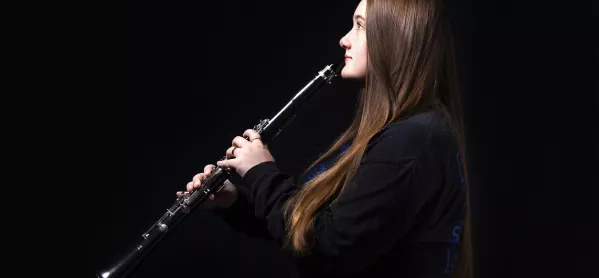- Home
- ‘Myopic politicians are risking our musical future’
‘Myopic politicians are risking our musical future’

In a telling - if chilling - column, The Times arts editor, Richard Morrison, discussed the threat posed to the BBC by the proposal that its licence fee be replaced by voluntary subscription: he fears this country will “sleepwalk into cultural catastrophe”.
Morrison fears that we might drift into losing the BBC’s professional, salaried orchestras, “because the politicians and media grandees who will negotiate how the BBC is funded [haven’t] thought about the wider implications of ending the licence fee.”
Wider implications are often missed in educational policy shifts, too.
Take music. Grassroots learning of musical instruments, in schools and communities, has been squeezed for three decades.
When the gradual process of devolving funding from local authorities directly into schools began in the late 1980s, such centrally provided services as special educational needs and disabilities and music were overlooked.
Empty hopes
The naïve hope, 30 years ago, that individual schools, tight on funds, would buy into music centres, peripatetic teachers and local youth orchestras, bands and choirs was swiftly proved empty.
Free-to-all instrumental tuition - including the free loan of expensive instruments - rapidly disappeared, and that door to glorious cultural opportunity was closed to the poor.
The government will claim that it’s addressed this problem by creating “music hubs”.
Some are working well. But few - if any - offer opportunities to children from all backgrounds on the scale or in the quantity they enjoyed in the 1970s and 1980s, in hindsight a golden era for music.
Like all educational services, music hubs are struggling for cash, and for long-term government support.
Recently, they waited anxiously for months to hear whether their funding would continue: reassurance (if any) about their future will not be published until the autumn.
Whatever future unfolds for them, music hubs will not alone undo the damage of decades, wrought through the blindness and overly simple solutions of policymakers.
Not a problem, but a success
Did I mention blindness? In the same edition of The Times appeared a report that “Oxford misses target for state-school pupils”.
I don’t need to go round that block again. But - slipped in almost as an afterthought - came the concern that: “Despite their small numbers, the biggest proportional gaps [between state and privately educated students] were at some conservatoires.” The Royal Academy and Royal College of Music were cited.
Of course, those gaps exist. But such lazy comment misses the point.
I don’t have precise figures, but am pretty certain that the majority of UK conservatoire students come from the country’s few specialist music schools, all independent charities, but largely state-funded.
That’s not a problem, but a success. The UK’s music conservatoires are the best in the world.
To win places in them, even prodigiously talented candidates need time for learning and practising unavailable in mainstream schools, notwithstanding the considerable extracurricular opportunities afforded by the same conservatoires’ junior sections on a Saturday.
England’s four specialist music schools - Purcell, Yehudi Menuhin, Wells Cathedral and the recently televised Chetham’s Schools - enable their pupils to concentrate on developing the unusual talent that, far too often, makes them the target of bullying in mainstream schools.
Gloomy conclusions
These are not privileged children, except in the musical gift that nature gave them.
More than 80 per cent have their fees paid, if parsimoniously, by the government’s Music and Dance Scheme.
Almost all the rest are bursary-funded. Only tiny numbers come from homes that can afford fees.
Pupils know that their chosen career won’t make them rich. They desperately seek scholarships to help them through conservatoire, and compete to win the loan of an instrument, whose value is beyond their means.
This country needs to develop its elite musicians. As in the provision of much Send support, specialist private schools do the required job for the government, and provide excellent value.
To see these schools as a problem is myopic and dangerous, ignorant and prejudiced - yet all too common.
Richard Morrison saw such ignorance at a recent meeting: “I saw a few MPs…and the potential threat to five orchestras and the Proms came as news to them.”
Whether it’s through ill-informed threats to specialist independent schools or to the BBC, Morrison’s gloomy conclusion is right: “Our future as a premier-league musical nation has rarely seemed so clouded.”
Bernard Trafford is a writer, educationalist, musician and former independent school headteacher. He tweets @bernardtrafford
Keep reading for just £1 per month
You've reached your limit of free articles this month. Subscribe for £1 per month for three months and get:
- Unlimited access to all Tes magazine content
- Exclusive subscriber-only stories
- Award-winning email newsletters



